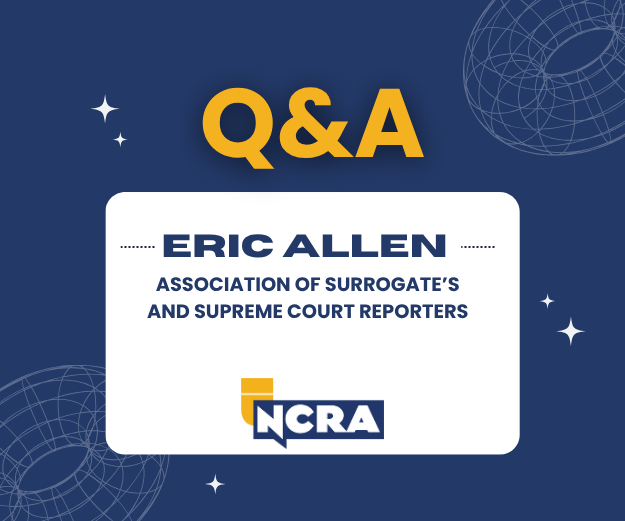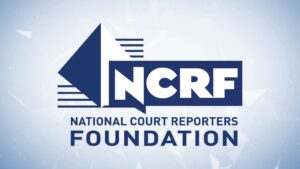Did you know that there is a union for a group of court reporters in New York City? The JCR reached out to NCRA member Eric Allen, president of the Association of Surrogate’s and Supreme Court Reporters (ASSCR), to learn more about him and the organization. Allen has been a member of ASSCR since 2010 and president since 2016, rising through the ranks of court reporters, so he knows the issues and what it’s like to do the work.
Let’s learn more about the organization together.
JCR | Can you first give us a little explanation of what ASSCR is?
Eric Allen | ASSCR stands for Association of Surrogate’s and Supreme Court Reporters, and we also distinguish it further, as the full entity name is Association of Surrogate’s and Supreme Court Reporters Within The City of New York. At this point in time, we do not use the “Surrogate’s” portion. Though the “Surrogate’s” is in the title, we seldom cover Surrogate’s Court work because years ago they moved to using recordings instead of a live stenographer. The irony there is that we get calls to cover what they deem to be their more important, large-scale cases, because they do not want to deal with the recording issues and need the expertise of our superiorly skilled members.
We are the labor union for senior court reporters who work for the New York State Unified Court System. Our members are stationed in the five boroughs of New York City: Staten Island, Manhattan, The Bronx, Queens, and Brooklyn. Senior court reporters work in the highest trial courts for the state, known in New York as the Supreme Court. In the Supreme Court parts in New York, the criminal term hears cases that are classified as felonies and punishable by more than a year in prison, and the civil term hears cases involving claims above $25,000.
JCR | As a union, what benefits or actions do you provide for your members that the national and state court reporting associations do not?
EA | What we do is very distinctive from our national or state associations. Though our title says “Association,” we are a labor union. We bargain with New York State for wages, for certain work conditions. We handle, should the need arise, disciplinary charges, possible grievances that may arise – and they do. Equally as important, we provide a vast array of benefits to our members such as dental, vision, legal representation, reimbursements, paid sick leave time for long-term illnesses, and continuing education, to name a few.
In 2018 we were able to increase the page rate for transcripts ordered by city agencies. Also, due to present staffing shortages, we were successful in having New York State and the Office of Court Administration waive a salary cap on retired reporters who are desirous of working in the court system on a per diem basis.
JCR | Who can belong to ASSCR?
EA | Only senior court reporters who are assigned to Supreme Court in one of the five boroughs of New York City can belong to ASSCR, or individuals who are provisionally Senior Court Reporters, meaning they are waiting to successfully pass an exam to become a senior court reporter.
JCR | What are the key issues you are working on right now? Can you tell us about a recent win?
EA | A key issue we will be embarking upon starting at the end of October is to negotiate page rates. It has taken quite some time to get all of the New York State unions representing court reporters together to do this. The unions statewide will collectively negotiate with our employer on this. It has been a long time coming, and we are eager to get to the table.
Within the past few years, we successfully arbitrated against what we deemed to be, and what the arbitrator deemed to be, a disciplinary rule wherein a special panel was put in place to determine discipline where a bias or discrimination charge was levied against a member. In our opinion, and in the arbitrator’s as well, the employer did not bargain for this additional level of discipline. It changed the rules relating to discipline, and the employer had to desist from implementing the changes to the disciplinary process. In the world of court reporting, that may seem trivial, but in the world of employment, it is a major win.
In 2018 we were able to increase the page rate for transcripts ordered by city agencies. Also, due to present staffing shortages, we were successful in having New York State and the Office of Court Administration waive a salary cap on retired reporters who are desirous of working in the court system on a per diem basis.
New York State offers students who have successfully completed their program a position with the title of court reporter trainee. It is a fantastic and unique opportunity for those who have just completed their program to start in the system and work their way up to court reporter and senior court reporter.
JCR | Recruitment is in the minds of many people at the national and local level. What is your view of recruitment and retention, and how are you helping?
EA | Recruitment is now a major issue, as is obvious, that stares us in the face daily. I believe one of the issues with recruiting reporters to work in the court system is the ability for freelance reporters to be able to work from home on a daily basis, not having to commute and the freedom of working on the days they choose. Additionally, New York State made changes to their pension tier system, and the most current tier is not nearly as attractive as the prior tier. I don’t want to bore you with the details, but the new tier, Tier 6, requires the member to pay into the pension system for the entirety of their employment, but you are severely penalized with a reduction in your pension if you retire between 55 and 63.
I or my members attend many career days and job fairs and promote the field to as many young adults and working adults as we can. Whenever I or someone attends one of these functions, we are sure to tout the excellent pay and benefits you can expect by being an official reporter in New York State. We reach out to guidance counselors so we can attend whatever career days are being held in our area and even throughout the state. I am often invited to speak at a local court reporting program at Plaza College, which happens to be an NCRA-approved program. I am pretty aggressive in recruiting these talented students. New York State offers students who have successfully completed their program a position with the title of court reporter trainee. It is a fantastic and unique opportunity for those who have just completed their program to start in the system and work their way up to court reporter and senior court reporter.
JCR | What would you tell someone just starting out in court reporting?
EA | I would, and I do, tell anyone just starting out that you never stop learning in this field. Any day at work can be significantly different than the prior day. We are here to provide an extremely important service, so communication with our end user is extremely, extremely important. Professionalism, courtesy, and communication are key to having a successful experience. Do not be afraid to ask questions. Also, never stop honing the skill.
JCR | What is your vision for the future of ASSCR? And what is your vision for the future of court reporting?
EA | As a union, the future of what we do is strengthened by numbers and by the members themselves. We will continue to provide for our members, bolster their benefits and work experience where we can, and maintain an atmosphere of integrity within the court system.
In the ever-changing technological environment we are in, it is essential for present day and the future that we continue to prove our gold-standard excellence, our reliability, and our professionalism because we are tasked with such an important function. In the future as in the present, our skill and adeptness will always hold our place at the table in the legal system and beyond.
Special thanks to Eric Allen for participating in this interview. He can be reached at asscr1@aol.com.




